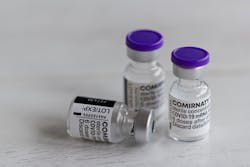Three doses of Pfizer–BioNTech COVID vaccine better than two
A Kaiser Permanente study published in The Lancet Regional Health — Americas found that one month after a third dose, the Pfizer-BioNTech COVID-19 vaccine effectiveness is higher for preventing infection and hospitalization than two doses of the vaccine after one month, according to a news release from the organization.
“When we looked at the effectiveness of the two doses of Pfizer-BioNTech vaccine versus three doses, we see a benefit with three doses that exceeds that achieved with two doses alone,” said Sara Y. Tartof, PhD, Epidemiologist with the Kaiser Permanente Southern California Department of Research & Evaluation.
The study assessed the primary series of two doses of the Pfizer-BioNTech COVID-19 vaccination effectiveness against infection, hospitalization, and death up to eight months after vaccination, and also assessed the effectiveness of three doses of the vaccine up to three months after vaccination.
To assess effectiveness, this research study evaluated electronic health records of 3.1 million members of Kaiser Permanente in Southern California from December 14, 2020, to December 5, 2021. During the study period, 197,535 (6.3%) patients were infected with SARS-CoV-2, and of those, 15,786 (8%) were admitted to the hospital. During the study period, the predominant variant was Delta, and not Omicron.
The researchers found that two-dose vaccine effectiveness against infection declined from 85% during the first month after vaccination to 49% up to eight months following vaccination. However, two-dose vaccine effectiveness against hospitalization remained high (90%) throughout the eight months and did not wane, except among people who were 75 years of age and older, or who had compromised immune systems.
For people who were immunocompromised, the protection against hospitalization dropped to 74%, and for those 75 and older, it was 77%.
Meanwhile, the three-dose vaccine effectiveness was 88% against infection and 97% against hospitalization within the first three months after vaccination.

